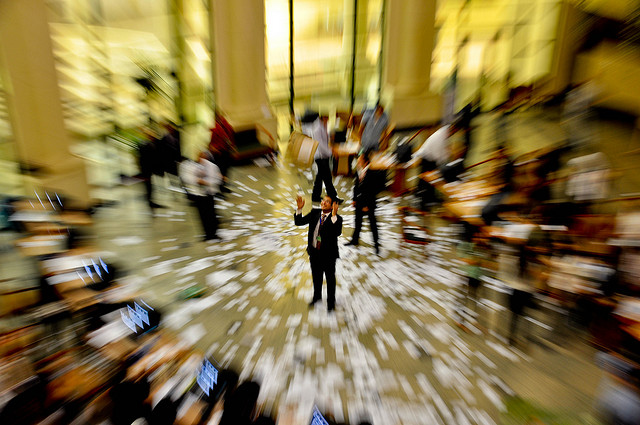Like this article? rabble is reader-supported journalism. Chip in to keep stories like these coming.
Start with money: bank loans and cash from family or other sources. For a firm or business, this represents its capital.
Use the capital to employ people to make a product or provide a service and sell it for more money — i.e. profit — so the capital grows.
As capital grows, what is owned by capitalists represents equity, and this ownership capital can be sold in shares on the stock market.
Share prices trade higher when buyers expect profits to grow.
Profit comes from pocketing the difference between what the workers produce in sales value and what they are paid. So, capitalists pay people as little as they can get away with, about as much as what workers need to get along in life.
Capitalists have to compete with each other and lower pay is one way they do it. Moving jobs to lower-wage countries has been a widespread way of lowering business costs.
Other ways include lobbying for lower taxes and easier environmental and labour regulations, and investing in political parties that deliver them.
Having access to low-cost borrowing is a main concern of capitalists. Central bankers are watched closely as central banks set interest rates.
As the capitalist class gathers this week in Davos, Switzerland for the World Economic Forum, the corridor talk is going to be about the rising cost of U.S. dollar loans and the collapsing price of share capital, as stock markets tumble around the world.
To begin the year 2016, both the U.S. Dow Jones index of leading stocks, and the broader Standard & Poor’s index are off to their worst start ever.
At the end of 2015, the U.S. Federal Reserve Bank raised interest rates by 250 basis points or one-quarter of one per cent. It has been widely expected that this will be the first of four increases to come, so that overall in 2016, the U.S. central bank rate would rise by one per cent.
As the cost of borrowed capital goes up, the expected profit rate goes down. This has lowered expectations about stock market prices which have been climbing for years. World stock markets have fallen, imitating depressed U.S. stock prices.
In the case of China, where banks are considered shaky, the stock market slump pre-dated the fall in U.S. stock prices.
It would be nice to think U.S. central bankers have things under control but there is good reason to doubt it. In the late 1970s, and early 1980s, the American central bank led by Paul Volcker raised interest rates to the 20 per cent range, creating a debt crisis that has plagued poorer countries ever since.
U.S. central bank chief Alan Greenspan admitted to keeping interest rates too low for too long after 2001, setting off a lending boom that brought Wall Street to its knees when the housing market faltered in 2007-08.
His successor Ben Bernanke orchestrated an estimated $7.7-trillion government-led bailout, that included the world’s richest banks, while distressed mortgage holders lost their houses.
Under Bernanke, the Federal Reserve pumped up the stock market by buying bonds. This credit expansion known as quantitive easing added trillions to its balance sheet. Current Fed Chair Janet Yellen, promoted from Vice-Chair in 2014, wants to slow credit growth.
The Fed is counting on a strong U.S. economy to withstand small interest rate hikes. Expect the Fed to be told to abandon further rate hikes as the economy weakens.
The European central bank has lately turned to looser credit in order to ignite a stagnant European economy; it has not been working.
The Bank of Canada Governor Stephen Poloz has mused about Canada reducing already low interest rates to the zero rate that has been in effect in the U.S. until recently.
The poorly disguised intention of Governor Poloz is to talk down the value of the Canadian dollar in the hope of staving off the recessionary conditions that dominated the first six months of 2015.
The capitalist world economy is marked by recurrent systemic crisis. Workers lose out even in good times. Pushing wages down has worked for capitalists. The top one per cent held as much wealth as the rest of humanity last year, according to Oxfam.
Underwriting cheap credit worked for a while as well. Now capitalists fear the era of nearly free money is ending. The rest of us should question the workings of capitalism.
Duncan Cameron is the president of rabble.ca and writes a weekly column on politics and current affairs.
Photo: Ahmad Nawawi/flickr
Like this article? rabble is reader-supported journalism. Chip in to keep stories like these coming.




